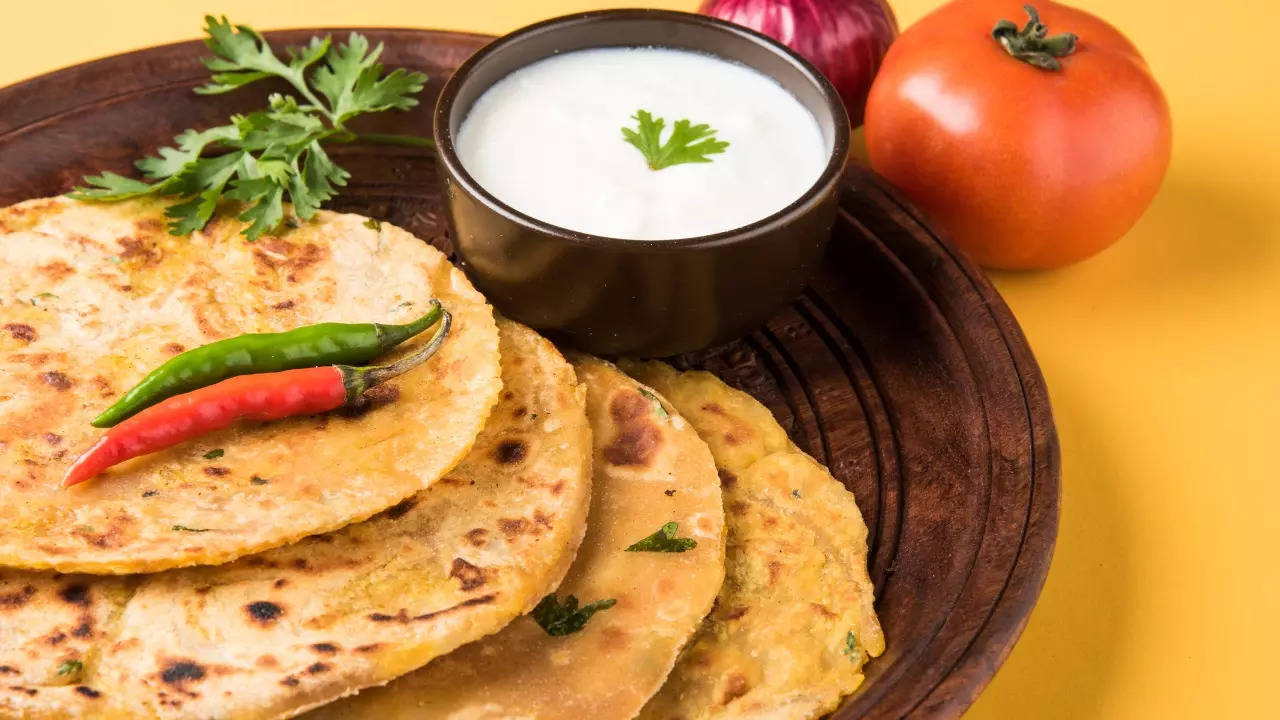In our quest for a balanced diet, understanding how different foods impact digestion is crucial. Two staples in Indian cuisine, dahi (yogurt) and parathas, are often enjoyed for their taste and nutritional benefits. However, their effects on the digestive process are worth exploring. This article delves into how these foods influence digestion and overall health.
Dahi, a probiotic food, contains beneficial bacteria like Lactobacillus that can positively alter gut flora.These good microbes regenerate our digestive system by neutralizing harmful bacteria, potentially slowing digestion in the process. When dahi is present in the stomach, it slows gastric emptying due to caseins precipitating in the low pH environment, coagulating, and affecting digestibility and gastrointestinal transit. Its thick texture requires more time and effort to break down compared to liquids or softer foods, and its fat content further delays gastric emptying and digestion.
Parathas are known for their high fat content due to the use of ghee or oil in cooking, which also slows down digestion. Fats take longer to process compared to carbohydrates and proteins. Made from whole wheat flour, parathas contain complex carbohydrates and dietary fiber that break down gradually, contributing to slower digestion. Additionally, spices and fillings like potatoes, onions, or paneer introduce extra complexity, making digestion even more prolonged.
Slow digestion can impact nutrient absorption, as certain minerals may bind to fibers or other compounds in foods, reducing their availability. There is concern that high fiber intake may impair mineral absorption, particularly calcium. Dietary fiber can bind with polyvalent mineral ions, forming unabsorbable fiber-mineral complexes, thus hindering their absorption in the body.
The impact of macronutrients on slowing gastric emptying is largely due to their caloric content rather than the specific macronutrient involved. High-calorie meals can eventually lead to significant weight gain. When individuals consume high-calorie meals, it can reduce esophageal sphincter pressure because the stomach produces more acid for digestion, potentially causing acid reflux.
Consuming foods rich in complex carbohydrates, fiber, and healthy fats, such as whole wheat parathas, can stabilize blood sugar levels by providing a gradual release of glucose into the bloodstream. This ensures sustained energy throughout the day and prevents energy slumps. These nutrients also promote satiety by increasing feelings of fullness and reducing overall calorie intake, which helps in weight management and curbing unhealthy cravings. Additionally, the dietary fiber in such foods supports gut health by feeding beneficial bacteria, improving bowel regularity, and reducing the risk of gastrointestinal disorders, contributing to overall well-being.
Well both dahi and parathas have complex effects on digestion due to their composition and preparation methods. While they can slow digestion, they also offer significant nutritional benefits that support overall health. Understanding these effects can help in making informed dietary choices that balance enjoyment with digestive health.
By Harsh Kanwar, Health Coach and Fitness Influencer
Dahi, a probiotic food, contains beneficial bacteria like Lactobacillus that can positively alter gut flora.These good microbes regenerate our digestive system by neutralizing harmful bacteria, potentially slowing digestion in the process. When dahi is present in the stomach, it slows gastric emptying due to caseins precipitating in the low pH environment, coagulating, and affecting digestibility and gastrointestinal transit. Its thick texture requires more time and effort to break down compared to liquids or softer foods, and its fat content further delays gastric emptying and digestion.
Parathas are known for their high fat content due to the use of ghee or oil in cooking, which also slows down digestion. Fats take longer to process compared to carbohydrates and proteins. Made from whole wheat flour, parathas contain complex carbohydrates and dietary fiber that break down gradually, contributing to slower digestion. Additionally, spices and fillings like potatoes, onions, or paneer introduce extra complexity, making digestion even more prolonged.
Slow digestion can impact nutrient absorption, as certain minerals may bind to fibers or other compounds in foods, reducing their availability. There is concern that high fiber intake may impair mineral absorption, particularly calcium. Dietary fiber can bind with polyvalent mineral ions, forming unabsorbable fiber-mineral complexes, thus hindering their absorption in the body.
The impact of macronutrients on slowing gastric emptying is largely due to their caloric content rather than the specific macronutrient involved. High-calorie meals can eventually lead to significant weight gain. When individuals consume high-calorie meals, it can reduce esophageal sphincter pressure because the stomach produces more acid for digestion, potentially causing acid reflux.
Consuming foods rich in complex carbohydrates, fiber, and healthy fats, such as whole wheat parathas, can stabilize blood sugar levels by providing a gradual release of glucose into the bloodstream. This ensures sustained energy throughout the day and prevents energy slumps. These nutrients also promote satiety by increasing feelings of fullness and reducing overall calorie intake, which helps in weight management and curbing unhealthy cravings. Additionally, the dietary fiber in such foods supports gut health by feeding beneficial bacteria, improving bowel regularity, and reducing the risk of gastrointestinal disorders, contributing to overall well-being.
Well both dahi and parathas have complex effects on digestion due to their composition and preparation methods. While they can slow digestion, they also offer significant nutritional benefits that support overall health. Understanding these effects can help in making informed dietary choices that balance enjoyment with digestive health.
By Harsh Kanwar, Health Coach and Fitness Influencer
Source link
Modified by Maaaty at Cheap Generic Pharmacy


